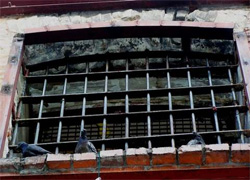The ambassadors returned, political prisoners remain
9- By Nikolaj Nielsen, EUobserver
- 26.04.2012, 12:24

All EU ambassadors are returning to Minsk in a bid to improve deteriorating relations with Belarus dictator Alexander Lukashenko, in power for the past 18 years.
“All EU ambassadors are returning to Minsk, including our own ambassador," a spokesman for Britain's Foreign and Commonwealth Office told Reuters on Wednesday (25 April).
EU ambassadors left Belarus in March in a display of solidarity when Lukashenko kicked out Polish envoy and the EU envoy in February for helping draw up new sanctions against the regime.
The sanctions targeted 29 Belarusian companies, blocked numerous accounts, and banned the travel into the EU of 12 additional officials, judges and police officers suspected of supporting Lukashenko’s crackdown on the opposition. Over 200 Belarus entities and people now find themselves on the EU blacklist.
Minsk, in a tit-for-tat response, recalled their own permanent representatives stationed in the EU, as well as their ambassador to Poland. But Minsk is now returning their envoys as well: Belarus' ambassadors to Poland and Belgium arrived on Wednesday.
Polish foreign minister Radoslaw Sikorski told media on Wednesday that the country's ambassador to Belarus “has already crossed the Polish-Belarusian border ... European solidarity appeared to be effective in this case,” he told Radio Free Europe.
Ambassadors from Sweden and Lithuania also crossed the border into Belarus on Wednesday, says Belarus opposition website Charter 97. The Czech ambassador to Belarus is reportedly returning on Friday.
The EU has been demanding the unconditional release all political prisoners before normalising ties with the increasingly isolated regime. The EU pressure appears to have partly worked, with Lukashenko on 14 and 15 April freeing prominent opposition politician Andrei Sannikov and his aide Dmitry Bondarenko.
Sannikov, a former presidential candidate, had over the past 16 months been submitted to torture and solitary confinement at the labour camp in Vitebsk, northeast Belarus. He has since rejoined his wife and five-year old son, both of whom had been under house arrest with movement limited to inside Minsk.
Bondarenko had been sentenced to two years in a penal colony in Mogilev, near the border with Russia.
His wife, Volha told this reporter in November 2011 that the KGB had tried to force him into signing a letter of confession and give evidence against others. “I know Dmitry will be released. I have hope,” she said.
Both men had been convicted of disturbing the peace for organising a demonstration against Lukashenko’s fraudulent reelection on December 2010. Both were given a presidential pardon.
The Office of the UN High Commissioner for Human Rights is calling upon the regime to release all remaining political prisoners, including human rights defender Ales Byalyatski and opposition activist Syarhey Kavalenka.
Nikolaj Nielsen, EUobserver










